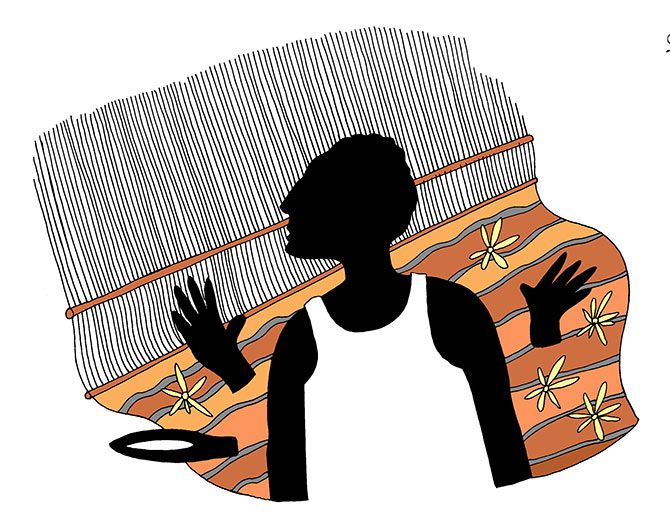'The children of today see Bollywood heroines dancing to item numbers in clingy georgette saris with bright gold machine embroidery.'
'To them, the Sambalpuri saris look and feel like shapeless, dull sacks.'
'The tragedy of the weaver isn't that he doesn't get enough respect and understanding from people like us,' says Geetanjali Krishna.
Illustration: Uttam Ghosh/Rediff.com

Traditional textile weaves have always fascinated me and often, when I sink in to a daydream, my mind wanders off to imagine a lonely artiste, painstaking printing single colour patterns one on top of the other, to finally produce the jewel tones of ajrakh.
Sometimes I dream of dyers in a steamy Jamnagar workshop, wrapping tiny bits of fabric around needles to create the finest bandhej, tie and dye, in the country.
Needless to say, these are the fabrics I've chosen to wear every day of my adult life, much to the exclusion to everything else.
Over the years, every time I've met a weaver, I've always asked him to tell me about the best fabric he has ever made.
The stories that I've heard in response invariably serve to increase my passion for all things woven.
So recently, when I learnt that Kamala, who works as a part-time domestic worker in the neighborhood was from Sambalpur in Odisha, I immediately struck a conversation with her.
Sambalpur is known for its bright ikat weaves which I'm particularly partial to.
"I come from a weaving family myself," said she. "My two brothers and father all work on looms."
Kamala mentioned that her daughter was soon to be married and she was putting together a trousseau for her.
"It must be so easy for you," I said enviously. "You can get the bulk of it woven in house."
Her response made me realise that in these rapidly modernising times, the tragedy of the weaver isn't just that he sometimes doesn't get enough respect and understanding from people like us -- even his own community often aspires for things other than what he makes.
"My daughter has lived in Delhi all her life," said Kamala. "She wants her trousseau to consist mainly of salwar-kameez and a couple of 'fancy' saris."
She said that this suited her very well, as for the price of one traditional Sambalpuri sari, she could buy several mill-made ones.
"The children of today see Bollywood heroines dancing to item numbers in clingy georgette saris with bright gold machine embroidery," she said. "To them, the Sambalpuri saris look and feel like shapeless, dull sacks."
Perhaps Kamala should encourage her daughter to see her uncles and grandfather weave, I suggested, believing naively that simply observing the labour-intensive and yet highly creative process of weaving an Ikat sari would probably inculcate respect, if not love for it.
Her daughter had not only seen her uncles and grandfather work their trade, Kamala countered, she had also seen them struggle to make ends meet over the years.
She then added that even she preferred the easily maintained mill-made saris available in Delhi to the traditional ones that her father and brothers wove back home.
"The fashion has changed," she informed me loftily. "And I'm glad. Those heavy cotton saris made me look shorter and stouter."
"My cupboard is full of saris and stoles from Sambalpur," I said in protest of Kamala's callous dismissal of a centuries-old craft.
"It's all right for you," she said. "At your age, you can get away by not keeping up with current fashions."
I don't know how old she thought I was, but one thing was clear: My generation probably has the last of the genuine lovers of handloom and handicraft.
I said as much to her and wondered aloud: "What will happen to weavers like your brothers after I'm gone?"
She shrugged (too cold bloodedly for my liking, I must add) and said, "They'd be gone too. Perhaps both the sari and its wearer will disappear off the face of this earth after your generation has passed."











